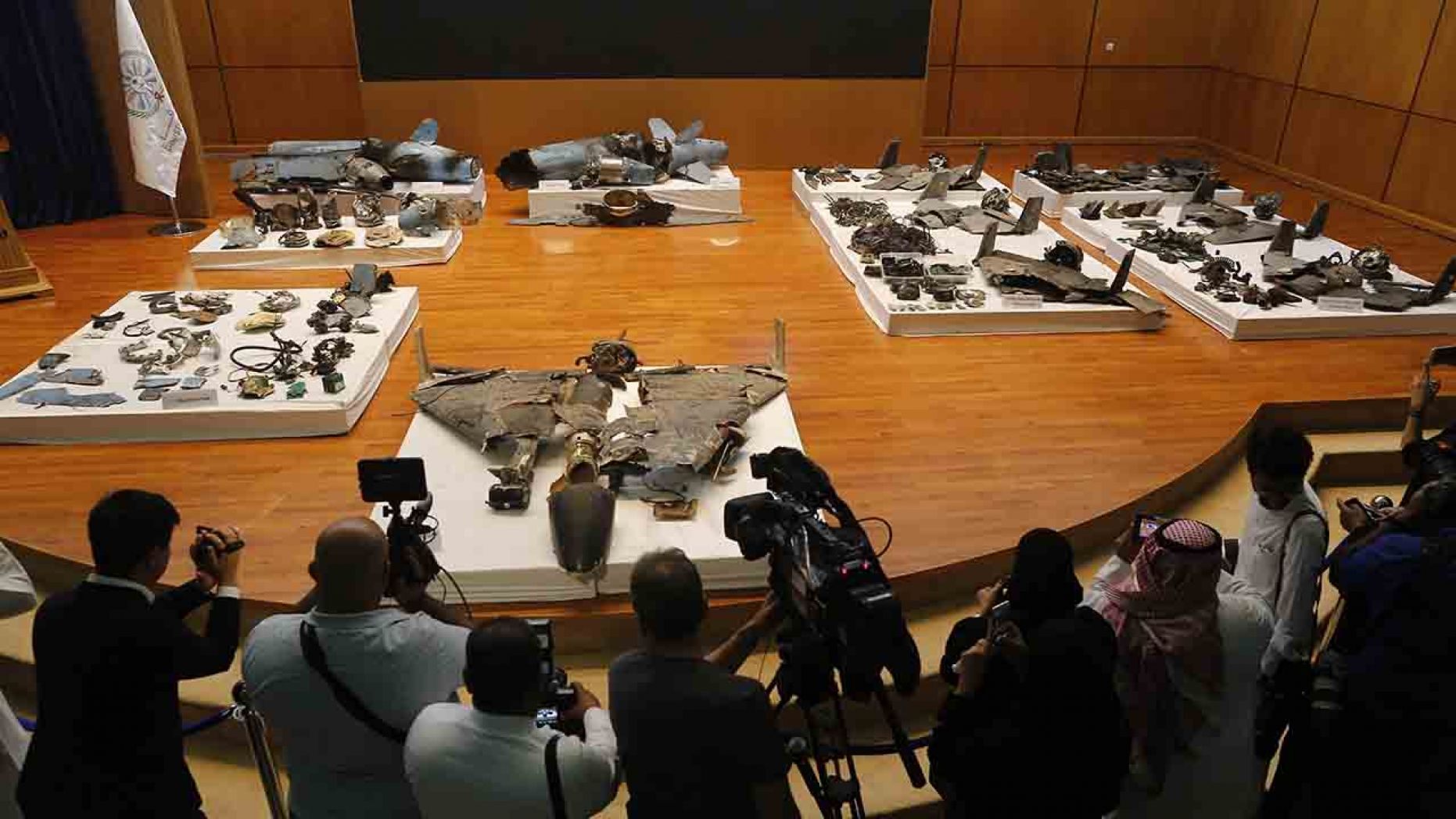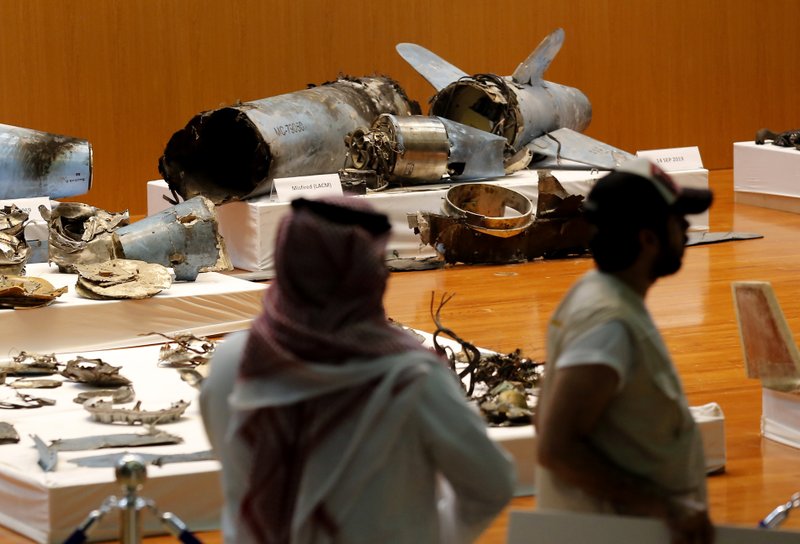U.S. Secretary of State Mike Pompeo described the weekend bombing on Saudi oil facilities as an “act of war” and called it an “Iranian attack” on one of the world’s largest oil processing facilities.
Pompeo, speaking from Jeddah, Saudi Arabia, on Wednesday, said that even if the “fraudulent claims” of responsibility by the Yemen Houthi rebels were true, “it doesn’t change the fingerprints of the Ayatollah as having put at risk the global energy supply.”
His comments come hours after President Trump tweeted that he had ordered Treasury Secretary Steven Mnuchin to “substantially increase sanctions” on Iran, amid escalating tensions between the two countries.
Meanwhile, Saudi Arabia alleged Wednesday an attack by drones and cruise missiles on the heart of the kingdom’s oil industry was “unquestionably sponsored by Iran,” naming but not directly accusing Tehran of launching the assault. Iran denies being involved in the attack claimed by Yemeni rebels, and has threatened the U.S. that it will retaliate “immediately” if Tehran is targeted in response.
*****SIGN UP NOW —- GET YOUR NEWS IN RECORD TIME***** Make sure you are one of the more than 22,000 that signed up to YWN WhatsApp Status to receive news in live time. Click this link – or send a message to 1-888-4-YW-NEWS (888-499-6397) – to see our status posts*****

The news conference by Saudi military spokesman Col. Turki al-Malki comes after a summer of heightened tensions between Iran and the U.S. over President Donald Trump unilaterally withdrawing America from Tehran’s 2015 nuclear deal with world powers. The U.S. alleges Iran launched the attack, which Yemen’s Houthi rebels earlier claimed as a response to the yearslong Saudi-led war there that’s killed tens of thousands of people.
Al-Malki made a point not to directly accuse Iran of firing the weapons or launching them from inside of Iranian territory. The kingdom has sought help from international investigators and the United Nations, both lengthening the probe and internationalizing its conclusions.
“The attack was launched from the north and was unquestionably sponsored by Iran,” al-Malki told journalists.
By stopping short of saying the missiles were launched from Iran, the kingdom potentially avoids a response that could lead to war among the heavyweight countries of the region and international superpower, the United States. However, not retaliating to the strikes also carries the risk of leaving Saudi Arabia exposed to continued attacks.
The news conference took place with a backdrop of broken and burnt drones and pieces of one cruise missile allegedly collected from the attacks.
Al-Malki described the drones as “delta wing” models, which looked like large triangles. The cruise missile, which al-Malki described as a “Ya Ali” type, had a small jet engine attached to it.
Eighteen drones and seven cruise missiles were launched in the assault, Al-Malki said, with three missiles failing to make their targets. He said the cruise missiles had a range of 700 kilometers (435 miles), meaning they could not have been fired from inside Yemen. He played surveillance video he said showed a drone coming in from the north. Satellite images released earlier by the U.S. showed damage largely on the north-facing sides of structures at the sites.
“This is the kind of weapon the Iranian regime and the Iranian IRGC are using against the civilian object and facilities infrastructure,” he said, using an acronym for Iran’s paramilitary Revolutionary Guard.
He added: “This attack did not originate from Yemen, despite Iran’s best effort to make it appear so.”
Iran sent a note to the U.S. via Swiss diplomats in Tehran on Monday, reiterating that Tehran denies being involved in the Saudi attack, the country’s state-run IRNA news agency reported. The Swiss have looked after American interests in Tehran for decades.
“If any action takes place against Iran, the action will be faced by Iran’s answer immediately,” IRNA quoted the note as saying. It added that Iran’s response wouldn’t be limited to the source of the threat, suggesting it would inflict damage beyond what it had suffered.
IRNA separately reported Wednesday that Iran’s first delegation for the annual U.N. General Assembly meeting had not left Iran because the U.S. has yet to issue them visas. Foreign Minister Mohammad Javad Zarif was to travel to New York on Friday, with Iranian President Hassan Rouhani following Monday, according to the agency. The U.N. meeting had been considered as an opportunity for direct talks between Rouhani and Trump.
As the host of the U.N.’s headquarters, the U.S. is mandated to offer world leaders and diplomats visas to attend meetings there. But as tensions have risen, the U.S. has put increasing restrictions on Iranians like Zarif. Since becoming Iran’s president in 2013, Rouhani has spoken each year at the General Assembly.
The U.S. State Department said it declined to discuss “private diplomatic correspondence” when asked about the Iranian note to the Swiss.
Trump separately tweeted Wednesday: “I have just instructed the Secretary of the Treasury to substantially increase Sanctions on the country of Iran!” He did not elaborate. National Security Council officials declined to comment.
U.S. Secretary of State Mike Pompeo arrived Wednesday night in the Red Sea city of Jiddah, where he was scheduled to meet with Saudi Crown Prince Mohammed bin Salman. Pompeo will later travel to the United Arab Emirates on Thursday to meet with Abu Dhabi’s powerful crown prince, Sheikh Mohammed bin Zayed Al Nahyan. Both nations are U.S. allies and have been fighting against the Houthis in Yemen.
Pompeo told reporters en route to Saudi Arabia that “it doesn’t matter” whether the Houthis claim they were behind the attack. “This was an Iranian attack,” he said.
“It doesn’t change the fingerprints of the ayatollah as having put at risk the global energy supply,” he said, referring to Iran’s Supreme Leader Ayatollah Ali Khomenei.
Meanwhile, the state-run Saudi Press Agency carried a statement Wednesday saying the kingdom had joined a U.S.-led naval coalition to secure the Mideast’s waterways. Australia, Bahrain and the United Kingdom already have joined the mission.
Earlier in Tehran, Rouhani told his Cabinet that Saudi Arabia should see the weekend attack as a warning to end its war in Yemen, where it has fought the Houthi rebels since 2015 and sought to restore the internationally recognized government.
Rouhani said Yemenis “did not hit hospitals, they did not hit schools or the Sanaa bazaar,” referring to the Saudi-led coalition’s widely criticized airstrikes on civilian targets.
He added that Iran does not want conflict in the region, but it was the Saudi-led coalition that “waged the war in the region and ruined Yemen.” Saying the Houthis were responsible for the drone strikes, he said: “They attacked an industrial center to warn you. Learn the lesson from the warning.”
(AP)












One Response
It would seem that Israel could shed some light on this attack, perhaps they are